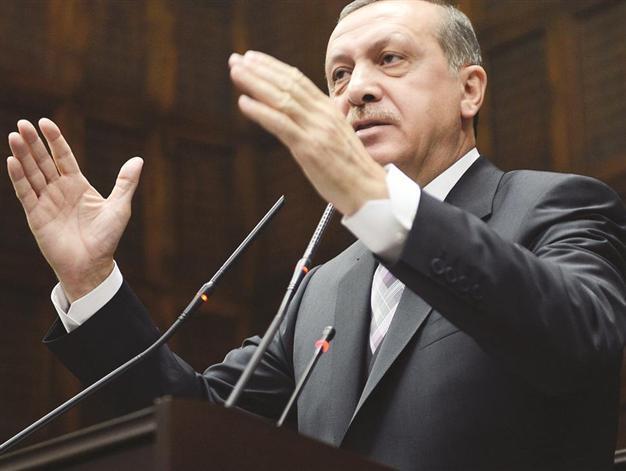‘Peace process’ still on, PM says for PKK talks
ANKARA - Hürriyet Daily News

Prime Minister Recep Tayyip Erdoğan says provacations will not stop the talks between officials and Öcalan. DAILY NEWS photo / Selahattin SÖNMEZ
Prime Minister Recep Tayyip Erdoğan has vowed to continue the “peace process” aimed at ending the three-decade old conflict between security forces and the outlawed Kurdistan Workers’ Party (PKK) while admitting that potential provocations and sabotage threatened the negotiations.
“We are hopeful on this recent process. We aren’t losing our hope no matter what happens. We are cautious and careful, but we are still hopeful,” Erdoğan said yesterday in an address to his ruling Justice and Development Party’s (AKP) parliamentary group meeting. “We will succeed in this process despite attempts at provocations and sabotage, with the help of our nation and with the will of the God.”
“The peace process,” or “İmralı process,” refers to recent talks involving Abdullah Öcalan, the imprisoned leader of the PKK who is serving a life sentence on the İmralı island prison in the Marmara Sea. In late December 2012, Erdoğan revealed that intelligence officials were holding talks with Öcalan to convince PKK militants to lay down their arms and withdraw from Turkish soil. On Jan. 3, two lawmakers, Peace and Democracy Party (BDP) deputy Ayla Akat and independent deputy Ahmet Türk, were allowed to visit Öcalan as part of the process.
Nonetheless, the slaying of three Kurdish women in Paris on Jan. 9, just days after a critical point within the process, raised concerns about whether the climate of hope for the resolution to the Kurdish issue could survive.
Sakine Cansız, one of the founding members of the PKK; Fidan Doğan, the Brussels-based Kurdistan National Congress’ (KNK) Paris representative; and Kurdish activist Leyla Söylemez were murdered in the office of the Kurdistan Information Center in central Paris. French authorities have launched an investigation into the murders, but it still remains unclear who the perpetrators were.
BDP officials initially called on the French and Turkish governments to find those responsible while voicing the possibility that the Turkish “deep state” might be responsible for the killings.
Erdoğan, in response, denounced such accusations as “irresponsible and tactless.” “Accusing [the Turkish] state and government right after the assassinations in Paris is no different than putting an opportunity on a silver platter for the real perpetrators,” Erdoğan said.
Erdoğan also addressed the families of soldiers who have lost their lives in the fight with the PKK, assuring them that there would be no disrespect to the memories of their fallen loved ones during the process.
Holding talks with the PKK leader does not mean surrendering to terrorism, Erdoğan said. “Nobody can make us surrender. We did not take a step back in the face of any attack, we will not take any step back.”
Erdoğan also warned against any provocations ahead of the three women’s funerals tomorrow in the southeastern province of Diyarbakır.
Directly calling on the people of Diyarbakır, as well as people living in the cities where the three women will be laid to rest, Erdoğan said the funerals should not become a platform for provocations. “There is a desire to dynamite the peace process that we started; we should not allow this.”
The premier also blamed the main opposition Republican People’s Party (CHP) for acting as an advocate of the French government.
“We asked some questions to Paris on Saturday. The response came from the CHP leader, not Paris,” Erdoğan said. “Are you a lawyer for France, a spokesman for Paris? Is this your job? [They] have not clarified which country’s opposition party they are. He and his friends have to decide whether they stand against this process or support it.”
During a trip to China, CHP leader Kemal Kılıçdaroğlu said it was odd for Erdoğan to question the French president’s meetings with PKK members when Turkish state institutions had already begun new talks with the group.
Erdoğan had previously criticized French President François Hollande publicly for saying he knew one of the murder victims.
